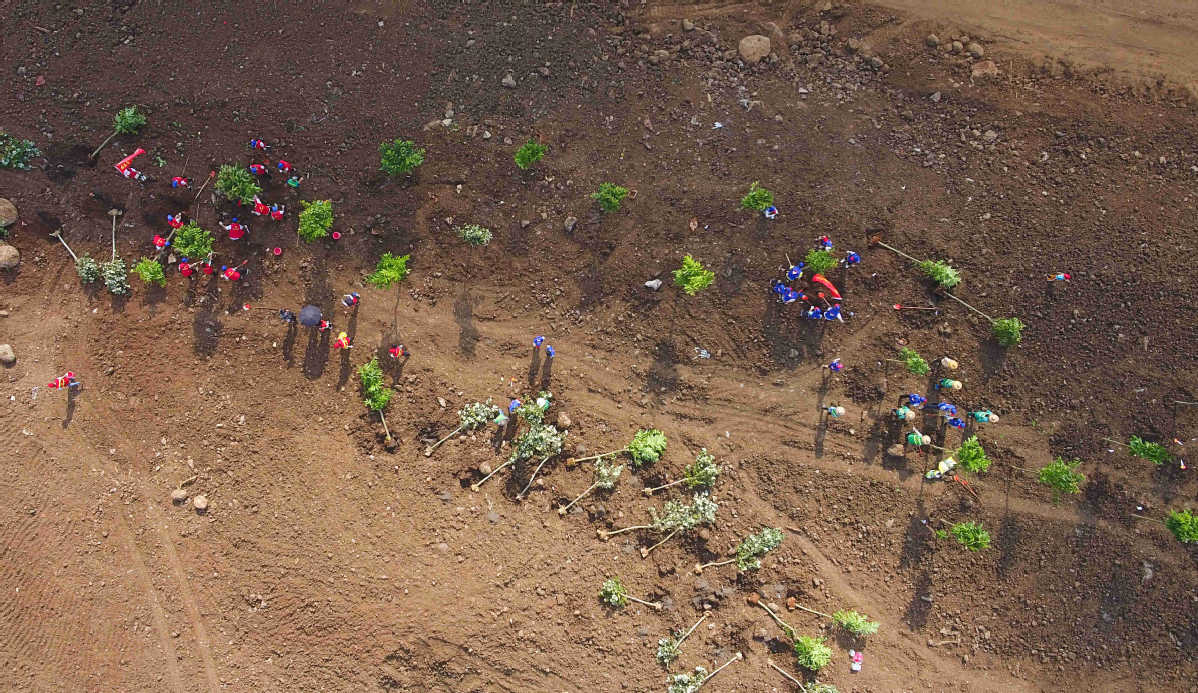Sorority turns coastal desert into forest


HAIKOU-In retirement, Tao Fengjiao enjoys taking a walk along the coast to visit her many "kids".
"Look how strong and tall they are!" Tao said, pointing to casuarina trees lining Qizi Bay in Hainan province.
The forest in Changjiang Li autonomous county holds cherished memories for Tao and her sorority of workers, who over the past 28 years have planted millions of trees to fend off the incursion of a coastal desert.
The bay was once barren, and whenever a typhoon hit sand would fill the air and sometimes threaten the safety of fishermen.
In 1992, a businessman leased the land near the bay in Changjiang and hired locals to plant trees for 7 yuan a day. Back then, men earned money by fishing and women stayed home to take care of the family. Tao's husband had died in an accident, so the mother of two joined the "Green Detachment of Women" to support her family.
In the beginning, their task was difficult. Facing large expanses of coastal desert and a harsh climate, they failed to plant any trees in the first three years.
The frustrated businessman abandoned the project, but the spirit of Tao's team remained. "The tree-planting drive was not only for the sake of our livelihoods but also to protect local people's safety," Tao said, explaining the determination to continue tree planting.
In 1995, the local government took over the afforestation project and invited German experts to provide guidance. Huang Jincheng, a former provincial forestry official, said the visit ended in frustration.
"We stood before a large expanse of desert, something that many people would not believe to exist on the island. It felt painful when the wind blew up the sand to hit our faces and bodies," he said. "The experts later concluded afforestation was just not feasible."
Yet Tao's team refused to give up. "When I was a kid, I saw there were trees on the bay, so I thought we could find some way to keep the saplings alive," she said.
With the help of domestic experts, Tao's team first tried to fix the moving sand by using thatch screw pine, a small plant resilient to salt and sand. They then planted casuarina trees, a taller evergreen that can resist strong winds.
The method, though feasible in theory, was not easy to implement back in the 1990s.
To protect the seedlings from coastal winds, they had to be soaked in water to make them heavier before planting. Without vehicles and cement roads, Tao used shoulder polls to carry the 60-kilogram saplings, walking barefoot on the burning sand.
Zhong Yingwei, another member of the team, said: "We could plant 400 trees per day. Sometimes when we ran out of drinking water, we drank from a trough. Because of the hot weather, our food often went bad."
Though some members left because of the hardship, Tao said the planting team had more than 60 women in its heyday.
According to the forestry department of Changjiang, the team has planted 5.88 million trees, covering an area of 2,253 hectares. Apart from the 1,253-hectare forest in Changjiang, their afforestation campaign later expanded to other parts of Hainan to help the province tame desertification.
In 2020, Tao was recognized as a "National Model Worker" for her persistent efforts on environmental restoration.
A beneficiary of the team's afforestation work is the local tourism industry. Since 2010, a number of high-end hotels have chosen Qizi Bay as their location, turning the former desert into one of the island's most popular tourist destinations.
After retiring from the tree-planting team, most members were recruited by local hotels to water flowers and trees, which brings them about 2,800 yuan a month each.
Team member Chen Shenglian said: "Twenty years ago, we could not even earn 3,000 yuan ($464) a year, but now we can earn that amount of money in a month. Our efforts have paid off."
- Memorial ceremony remembers victims of Nanjing Massacre
- Louvre's largest showcase in China goes on display at Museum of Art Pudong in Shanghai
- Indonesian foundation to fund students, school administrators to exchange and study in Tianjin
- Archives detailing crimes of Japanese unit released
- 'Reservoirs of primordial water' may be buried deep within Earth
- China remembers victims of Nanjing Massacre, 88 years on




































